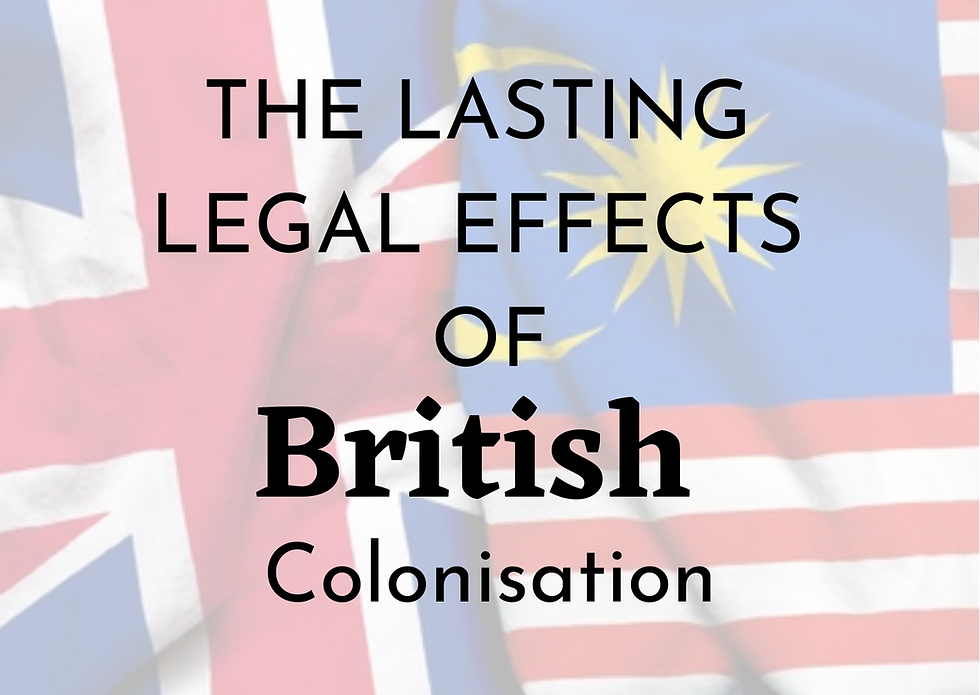Britain's Hold on Malaysia
- Lexicon Editorial Board

- Aug 14, 2021
- 5 min read

On 31st August 1957, our "founding father" Tunku Abdul Rahman shouted the seal of the independence of the Federation of Malaya at the Merdeka Stadium, denoting the end of colonisation and marking the start of a democratic nation.
The Federation of Malaysia was formed in 1963 when former British colonies of Sabah, Sarawak and Singapore joined the Federation though Singapore left on peaceful terms in 1965. The history of Malaysia’s colonisation can be dated back to 1511 when the Portuguese first captured Malacca. While the Portuguese and Dutch were the earlier European colonies, the occupation of Malaya and Borneo by the British since 1786 with just one short interruption by the Japanese during the second world war is the landmark period of Malaysian Legal History.
This article will address the lasting legal and constitutional effects of British colonisation, felt by all of us, until this very day.
The Structure of Government
The constitutional and administrative structure of Malaysia was largely fashioned on that of the Westminster parliamentary system, a legacy of British colonial rule though with local adaptations. In Britain, constitutional battles over the centuries had converted an absolute monarchy into a constitutional one which also influenced the constitutional landscape of Malaysia. The Government of Malaysia is one of constitutional monarchy and is defined by Vernon Bogdanor as "a sovereign who reigns but does not rule’’. However, unlike the British, Malaysia has a rotational monarchy and the Yang di-Pertuan Agong is elected by the Conference of Rulers for a five-year term. Likewise, Malaysia’s Parliamentary democracy is based on the English Westminster system of Parliament and consists of the Dewan Rakyat and the Dewan Negara.
However, as well illustrated by Suffian LP in Ah Thian v. Government of Malaysia [1976] 2 MLJ, the doctrine of Parliamentary Sovereignty which underpins the British constitution does not apply in Malaysia given our codified constitution – something that arguably is a blessing given our unlucky political history (honestly, when will Malaysians catch a break?). The power of Parliament and State legislatures in Malaysia thus is limited by the Constitution, and they cannot (read: should not but somehow still do thanks to the corruption miraculously interwoven through the Malaysian political system) make any law as they please, as enshrined in Art. 4(1) of the Federal Constitution.
The Court System
According to Dr Chithra Latha Ramalingam, Malaysian Law has its intricacies wound by the British colonization and is reflected under the current laws and institutions that exist in Malaysia. The Malaysian justice system was originally based on the British and operates in parallel with Shariah courts because Malaysia is predominantly an Islamic state. During British colonial rule, the Courts Enactment 1919 was introduced to restructure the court system and created a hierarchy of courts. It was later replaced by the Courts Ordinance 1948 which laid down the foundation of the Malaysian Court System. But similar to the British, civil and criminal trials are generally adversarial rather than inquisitorial and we adhere to the common law traditions in the sense of judicial decisions being a source of law, judges delivering discursive judgments and the doctrine of stare decisis.
Sources of Law
According to Bryce “law was an effective instrument in the colonisation of nations”. Prior to the British administration, Malay customary and adat laws were the basis of the legal sources. However, English Common Law and equity were gradually adopted during British colonisation and were either made into local legislations or simply applied through case law. The modification of customary laws and the adoption of English enacted law was said to be the strategy of the imperial government to legitimise the British control. The reception of English law became statutory after the promulgation of the Civil Law Enactment of 1937. To date, it is enshrined under Sections 3 and 5 of the Civil Law Act 1956 and Section 5 of the Criminal Procedure Code. Further, the reception of English law can also be observed from the introduction of legislation that codified landmark English cases. This is reflected in many areas of law such as section 21 Companies Law Act 2016 which is derived from the English case of Salomon v A Salomon & Co Ltd [1896] UKHL 1, a case that laid down the doctrine of separate legal personality and the idea of “corporate veil”.
Common Law & Equity
While English law forms the backbone and the foundation of the Malaysian legal system, the general introduction of English common law and rules of equity has always been a subject of discussion and debate by many scholars. As an example, the Malaysian National Land Code has two main objectives: to provide simplicity and certainty in land dealings. As stressed by Jeffrey Tan FCJ in S & M Jewellery Trading Sdn Bhd & Ors v Fui Lian-Kwong Hing Sdn Bhd [2015] 5 MLJ 717 (FC) the whole Torrens system depends on registration and any derogation from it would cause the land title to be inconclusive. Thus, while s3 Civil Law Act 1956 is a ‘convenient' provision for the reception of English law, s6 Civil Law Act 1956 contains restrictions regarding the application of English law and equity in land matters.
Despite the express prohibition under section 6, the applicability of English equitable principles remains a conundrum in Malaysian Land Law and is still very much a living issue. Case law suggests that judges have repeatedly applied English equitable principles to achieve a fair and just decision. Ainul Jakia Maidin observed that the lack of coherent judicial construction of S6 Civil Law Act 1956 is due to the fact that equitable principle has gained popular support by many Malaysian Judges who are trained in England. This is in fact, an impact of the lengthy British Colonisation. Scholars have constantly argued that the CLA for a certain extent has curtailed this independent progressive society from developing its own law. In fact, Malaysian civil courts constantly and continuingly quoting English Judgement is evidence that the legal of imperial dependence still lives on.
Malaysia was once colonised by the British and it is unfortunate that we are still colonised mentally by their past glorious supremacy of the English common law. – Dr Chithra Latha Ramalingam:
Family Law
Further, the principles on which matrimonial relief is given in England has a significant impact in Malaysia. The main legislation governing family law in Malaysia is the Law Reform (Marriage And Divorce) Act 1976, which came into force on 1 March 1982. Section 47 of the LRA requires Malaysian courts to give relief on principles which is conformable to the principles on which the High Court of Justice in England acts and gives relief in matrimonial proceedings. Thus, as pointed out by Shankar J in Re Divorce Petitions Nos 18,20 and 4 of 1983 [1984] 2 MLJ 158 unlike section 5 of the CLA 1956 which only imports the application of English law in certain matters as it stood on July 7, 1956, section 47 of the LRA does not provide a specific cut off date. As a legacy from the colonized era English family law must therefore be read in a contemporaneous context and if applied must refer to the corresponding position in England today. This has always been a matter of debate where some commentators also called for its repeal or amendment as it is viewed that Malaysian family law must break out of the chain imposed by a, unfortunately, history of colonisation.
Alluding from the above discussion, it is clear that British Colonisation has a lasting legal impact on the Malaysian Legal and Constitutional System. The long history of British colonisation has prompted our legal fraternity, displacing hesitation in departing from English Law. On this 64th anniversary of our nation’s independence, It might be time for us to rethink whether Malaysia as a progressive society ought to break free from the legal imperialism of the British’s power.
References :
Chithra Latha Ramalingam, ‘Pride and Prejudice of Legal Imperialism and with Reference to Preserving English Law in Malaysia’ [2019] 5 MLJ xxxv
Shamrahayu A Aziz, ‘THE MALAYSIAN LEGAL SYSTEM: THE ROOTS, THE INFLUENCE AND THE FUTURE’ [2009] 3 MLJ xcii
Shaikh Mohamed Noordin and Lim Pui Keng, ‘An Overview of Malaysian Legal System and Research’ (NYU LAW) <https://www.nyulawglobal.org/globalex/Malaysia.html >



Comments